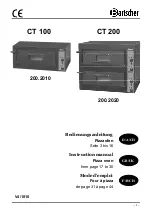
CLEANING AND MAINTENANCE
Periodic cleaning and proper maintenance will ensure efficiency, top
performance, and long life.
Exterior Cleaning
The door and cabinet may be cleaned with a mild detergent and
lukewarm water solution such as 2 tablespoons of baking soda to 1 quart
of water.
Do not use solvent based or abrasive cleaners. Use a soft sponge and
rinse with clean water. Wipe with a soft clean towel to prevent water
spotting. If the door panel is stainless steel, it can discolor when exposed
to chlorine gas and moisture. Clean stainless steel with a cloth dampened
with a mild detergent and warm water solution. Never use an abrasive or
caustic cleaning agent.
Interior Cleaning
The wine refrigerator’s interior should be cleaned occasionally.
1. Disconnect power to the unit.
2. Open the door and remove the contents and shelves.
3. Wait until the unit defrosts.
4. With a clean cloth, wipe down the interior of the unit.
5. Reinsert the shelves and beverages.
6. Reconnect power to the unit.
TROUBLESHOOTING
Before Calling for Help
If the unit appears to be malfunctioning, read through the OPERATION
section of this manual first. If the problem persists, check the
Troubleshooting Guide below and on the following page. The problem
could be something that can easily be solved or explained.
Symptoms Possible
causes Solutions
The wine cooler turns
on and off frequently.
The room temperature is
higher than the
recommended ambient
environment.
Run the cooler at the appropriate ambient temperature.
The door is being opened
often.
Minimize the number of times the door is opened.
The door is not completely
closed.
Make sure the door is completely closed.
The door gasket is not
sealing properly.
Make sure the door gasket is properly sealing.
The cooler does not have the
suggested ventilation.
Read and follow the “Installation Clearance
Requirements” section.
11




































